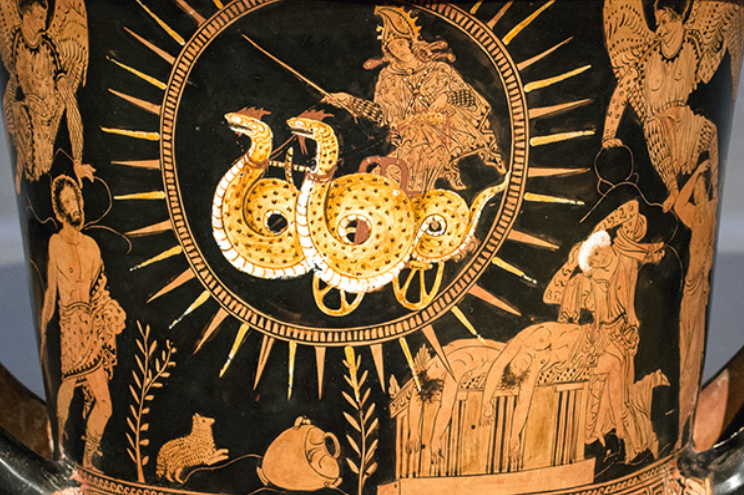Medea

Although the play is now considered one of the great dramas of ancient Greece, the Athenian judges did not react so favourably at the time. They awarded it third place (out of three) at the Dionysos festival of 431 BCE, much disappointing Euripides, its author. Even Sophocles came second that year!!
This lukewarm reception may have happened because of the extensive changes made by Euripides to the conventions of Greek theatre in the play: by including an indecisive chorus, by implicitly criticising Athenian society and by showing disrespect for the gods.
Medea is female given name. From the Greek Μήδεια Mēdeia, possibly meaning either to ponder or she who is cunning.
In Greek mythology, Medea was the granddaughter of the sun god Helios, and ran away from her father’s house to marry the hero Jason.
In the earliest versions of the myth, Jason and Medea’s children are later on killed by a crowd of Corinthians, angry at Medea’s behaviour. Greek tragedy likes to rework older myths, often to bring out the darkest aspects of human relationships, especially within the family.
Euripides re-sculpted her story in his play, adding the element that made her the Medea we know today – the woman who kills her own children to avenge her husband’s betrayal. In so doing, Euripides makes Medea breach a fundamental taboo: the bond between mother and child, and the assumption of unconditional maternal love.
So the first audience who saw Euripides’s play would have been incredibly shocked, being totally unfamiliar with a Medea who kills her children for vengeance.
The play explores many universal themes: passion and rage and revenge being the most obvious. Medea is from the start a woman of extreme behaviour and emotion. When Jason betrays her, she transforms her passion into rage and intemperate destruction – revenge at any cost, even willing to sacrifice everything that should be most dear to her as a woman and mother. But she is NOT inhuman: Euripides shows us with painful insight and utterly without condemnation the mind of the woman who has the ability to do such a murderous act: the torment before the final decision, the ultimate grief, and, in the final scene, the inevitable awful after-results.
Greeks, and apparently Athenians in particular, were fascinated by the thin line between greatness and hubris, or pride. They understood that the same traits that make a man or woman great can lead to their own destruction just as easily. Greatness leads – to pride/arrogance then – to some act ‘beyond the pale’, as all sense of proportion and decency is lost, and – finally to a terrible come-uppance.
But here, it is not quite so straightforward: Medea’s terrible act is in reaction to something she suffers at another’s hands. Overweening pride in herself is not the core fault here. It is more a fatal combination: of being a woman, and so not in control of herself (Strike one!), a foreigner, and so not so constrained by Nice Behaviour as a Greek would be (Strike two!!), and though intelligent (and manipulative), is left with no room in a patriarchal society to effectively protest (Strike three!!! … and you’re OUT!). She is condemned by her nature, her alienness and the society. To make a point, she has to go OTT! (Over TheTop).
As in most Greek tragedies, the plays did not require extensive changes of scenes. This one took place throughout outside the facade of the Palace in Corinth. Many events take place off-stage (like the deaths of Jason’s second wife Glauke and her father Creon, as well as the murder of her own children). All is described in elaborate speeches delivered by a messenger, and was not enacted before the audience.
****************************
The play opens with MEDEA grieving over the loss of her husband’s love!
Her husband Jason had been helped extensively by Medea in the quest of finding the Golden Fleece with the Argonauts, But Jason, wanting to climb socially, has decided to divorce Medea and marry the princess Glauke, daughter of King Creon. He does this, even knowing that he does not love her. He suggests that Medea could stay on as a mistress and should not complain or even worry about the future of her sons, if Jason and Glauke have sons of their own!!
Her elderly nurse and the Chorus of Corinthian women (sympathetic to her plight) fear what she might do to herself or her children. Creon also fearing what might happen after Jason marries his daughter, decides to banish Medea and her children – immediately. She begs for mercy, and is granted a reprieve of one day – all she needs to execute her revenge.
The hero Jason arrives and attempts to explain himself. He says that he does not care or love his new bride but cannot pass up the opportunity to marry a wealthy and royal princess! And goes on – his first wife like all women should obey their husbands and men! He also claims that he hopes one day to join the two families and keep Medea as his mistress.
The Chorus of Corinthian women and Medea do not believe him. She reminds him that she left her own people for him, murdering her own brother for his sake, so that she can never now return home. She also reminds him that it was she herself who saved him and slew the dragon which guarded the Golden Fleece —- but he is unmoved, merely offering to placate her with gifts.
MEDEA decides upon vengeance.
Her plans are to poison the golden robe (a family heirloom and gift from the sun god Helios) which she believes vain Glauke will not be able to resist wearing. She resolves to kill her own children as well, not because the children have done anything wrong, but as the best way her to punish Jason. She meets with Jason once more, pretends to apologise to him and sends the poisoned robe and crown as a wedding gift to his bride to be, with her children as the gift-bearers.
The poisoned robe does the trick – both Glauke and her father who attempted to save his daughter – die.
Medea then wrestles with herself over whether she can bring herself to kill her own children too, speaking lovingly to them all the while in a moving and chilling scene. After a moment of hesitation, she eventually justifies her act, as a way of saving them from the retribution of Jason and Creon’s family, in tirn out for revenge.
As the Chorus of women laments her decision, the children are heard screaming. The Chorus considers interfering, but in the end does nothing.
One wonders even today how many times have we like a chorus stood by as others have suffered beside us ….hearing their chilling screams or cries?
Jason discovers about the poisoning, and rushes to the scene only to learn that his children too have been killed.
But the chariot of Artemis has meantime appeared – to snatch Medea away, along with the corpses of her/their children. Medea prophesies that Jason too will come to a bad end (he eventually dies alone and unhappy), before escaping to Athens with her children’s bodies.
The play ends with the Chorus lamenting that such tragic and unexpected evils could only result from the will of the gods.
*********************************
Women in Ancient Athens had to stay within the domain of their house and had no political or much social freedom.
So, when Medea in this play, emerges with the words ‘I have come out of the house’ … those words can be read symbolically as a movement from the private sphere of the house into the public one —
(Gasp – horrors!!!! Women taking action in the public sphere? Collapse of civilization!!!).
In her most famous speech in the play (“Women of Corinth”, lines 214-266), Medea ruminates on women’s unfortunate social positions as the consequence of male domination through marriage. In this passage, Medea establishes the rationale for her actions: like other women at the time, she is politically powerless compared to her husband and the indifferent patriarchy that dismisses women as living “a life secure… at home, while [the men] confront the thrusting spears of war” (247-248). Even though she finishes the speech with a threat to enact a violent revenge on Jason and his new wife, the Chorus leader says that Medea is “justified in inflicting punishment”.
As Euripides intended – most astoundingly in his day, we see here a woman whose suffering, instead of taming her, has made her into a monster. She is fiercely proud, cunning and coldly efficient, unwilling to allow her enemies any kind of victory. She sees through the false pieties and hypocritical values of her enemies, and uses their own moral bankruptcy against them. Her revenge is total, but it comes at the cost of everything she holds dear. She murders her own children in part because she cannot bear the thought of seeing them hurt by an enemy.
Jason’s dismissive misogyny gives credence to Medea’s earlier argument that men can be callous and cruel towards women. He is indeed a hero, monster-slaying hero; but here, he is a destabilising force that destroys a family through his uncontrollable desire to ascend within the social hierarchy and to achieve his ambitions.
The power of Greek tragedy lies in its ability to offer the audience a ‘safe-space’ to explore the very worst-case scenarios (as we do today in books and films). It helps them and us confront the gap between our ideals about the world and our actual experiences of it. Family relationships are framed by a set of stereotypical social values: mothers are loving and altruistic, fathers protect and provide, children are dutiful and make their parents proud.
We, like the ancient Greeks, know that life isn’t always like this: marriages can be destructive and family members hurt each other. Whom do the police today first suspect in a murder: the nearest and dearest of the victim! Tragedy explores the ultimate expressions of our fears that life will disappoint us. They allow us the space to question what happens if marriages aren’t just damaging but actually murderous. Or if parents aren’t just inadequate but actively set out to destroy their children.
It is Medea’s ability to starkly uncover our worst fears, combined with its psychological plausibility, that makes the play as terrifying today as it was almost 2500 years ago.
Medea is one of the many female monsters in Greek legend that have shaped the Jungian myth of the dangerous and untrustworthy female character. But it not just women in ancient Greece that make monstrous choices, Medea is just one of many if a better known one to us.
Take Medusa. She was a beautiful maiden and high priestess in the temple of Athena, but was raped by Poseidon in a temple — something unforgivable even for a God. No other God or mortal came to her rescue then or after. Consumed with shame, despair and anger, became a monster that turned all those that looked into her to stone, until she herself was eventually destroyed.
Take Hercules. Yes, even him .. the paramount hero. In a fit of drunken rage (there is a get-out clause here, Hera ‘made me do it’!) he killed his children and wife (another daughter of the same Creon). Recovered he began with the advice from Delphi his labours to redeem himself. His acts of violence were soon forgotten …but then .. he was not a woman, so that’s OK then!
We are as women still today trying to find our place in this tragedy called life.

